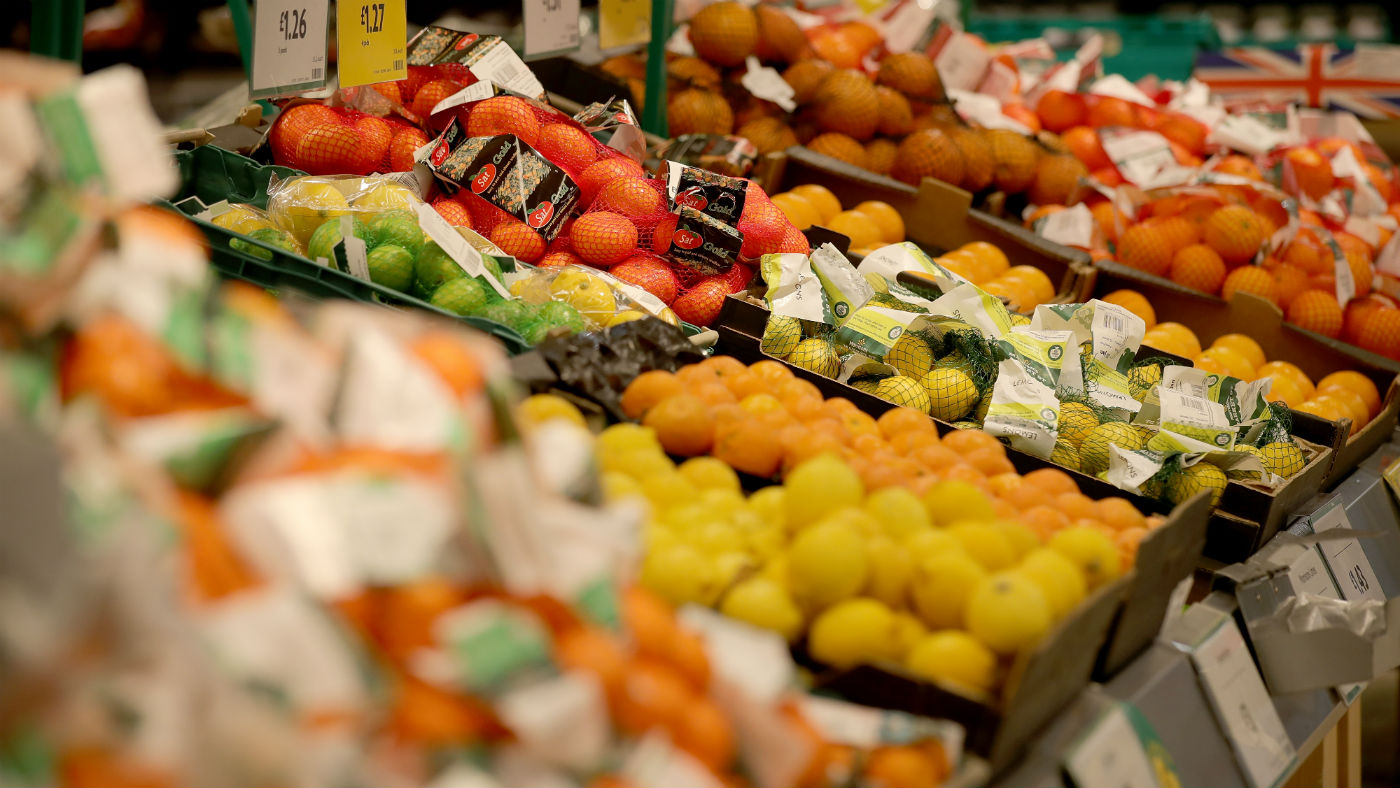Healthy eating tips for home: how to get your five a day during the lockdown
Buying frozen or canned fruit and veg is a nutritious alternative for the food shopping list

A free daily email with the biggest news stories of the day – and the best features from TheWeek.com
You are now subscribed
Your newsletter sign-up was successful
Keeping healthy during the lockdown does not just mean exercising your body and mind… it’s also about the food you eat.
Online deliveries and shop shelves may be sparse for some fresh fruits and vegetables, but there are other ways to plan meals and snacks which are both delicious and nutritious.
The NHS recommends at least five portions (a total of 400g) of a variety of fruit and vegetables each day.
The Week
Escape your echo chamber. Get the facts behind the news, plus analysis from multiple perspectives.

Sign up for The Week's Free Newsletters
From our morning news briefing to a weekly Good News Newsletter, get the best of The Week delivered directly to your inbox.
From our morning news briefing to a weekly Good News Newsletter, get the best of The Week delivered directly to your inbox.
Five a day may seem a struggle without fresh ingredients, but there are alternatives such as frozen or canned products.
Here we look at tips on how to get your five a day during the lockdown...
What counts in your five a day?
One portion is:
- 80g of fresh, canned or frozen fruit and vegetables
- 30g of dried fruit, which should be eaten at mealtimes, not as a between-meal snack, to reduce the risk of tooth decay
- 150ml of fruit juice, vegetable juice or smoothie (only once in a day)
- Unsweetened 100% fruit juice, vegetable juice and smoothies only ever count as a maximum of one portion
- 80g of beans and pulses - however, these only count once as part of your five a day, no matter how many you eat
- Sweet potatoes, parsnips, swedes and turnips do count. But while normal potatoes, yams, cassava and plantain are vegetables, they don’t count towards your five a day
–––––––––––––––––––––––––––––––For a round-up of the most important stories from around the world - and a concise, refreshing and balanced take on the week’s news agenda - try The Week magazine. Start your trial subscription today –––––––––––––––––––––––––––––––
A free daily email with the biggest news stories of the day – and the best features from TheWeek.com
Adds cans and tins to your shopping list
The British Nutrition Foundation (BNF) says canned vegetables can be just as healthy as fresh and should be worth considering for your shopping list.
“Canned peas, carrots and spinach are all nutritious and versatile, and why not try something new like heart of palm or artichokes if these are more readily available?” the BNF said.
“Add canned vegetables straight into curries and stews to bulk out your meals. Canned pulses like kidney beans or chickpeas are also a quick, nutritious addition to things like pasta sauces or salads.”
The NHS adds that if you opt for tinned or canned fruit and vegetables, then choose the ones in natural juice or water, with no added sugar or salt.
‘Eat your five a day’
On Instagram registered dietitian Nichola Ludlam-Raine published her tips on how to stay healthy and productive during isolation.
She advises: “Eat colour: I’ve said it before and I’ll say it again.. eat your 5 a day! Tinned & frozen count too (they contain more nutrients such as vit C than their fresh varieties too!). Try if you can though to buy fruit tinned in juice as opposed to syrup.”
Get the kids involved
Dietitian Azmina Govindji urges parents to include their children when planning the five a day at home.
“Familiarise young children with the colours and shapes of fruits and vegetables as early as possible,” she said. “If your children aren’t keen, canned vegetables, such as sweetcorn, lentils and peas, can be a good place to start.
“Try not to reinforce the idea that vegetables are unpleasant and always need to be hidden in foods. Instead, have fun together by trying lots of different fruit and veg, and finding what your children like.”
Snacks: plan ahead
Hide away the chocolate and crisps and prepare some delicious snacks in advance...
- Fill a fruit bowl and keep in the living room
- Fresh fruit can be washed and put in the fridge ready to eat
- Keep snack-ready vegetables such as sliced carrots or celery in the fridge
–––––––––––––––––––––––––––––––For a round-up of the most important stories from around the world - and a concise, refreshing and balanced take on the week’s news agenda - try The Week magazine. Start your trial subscription today –––––––––––––––––––––––––––––––
Five a day meal tips for families
Breakfast
- Add sliced fruit such as bananas, strawberries or sultanas to cereal, porridge or lower fat natural yoghurt
- Add grilled mushrooms or grilled tomatoes to scrambled eggs
- A handful of berries or a chopped banana
- A glass (150ml) of unsweetened 100% fruit juice, vegetable juice or smoothie
Lunch
- Add fruit and veg to favourite meals: chopped carrots in bolognese sauce; chopped red peppers on pasta; peas in mashed potato; tomatoes in an omelette; mushrooms in a stir-fry
- Include salad items in sandwiches
- Eat carrot sticks, celery sticks or cherry tomatoes with dips such as salsa or lower fat cheese spread
- Eat satsumas or seedless grapes for dessert
- Dried fruit - have a handful of sultanas or a few dried apricots as a dessert
Dinner
- Have two different vegetables on the dinner table
- Add fruit and veg to favourite meals
- Vegetables in dishes such as stews and casseroles also count, but avoid adding extra fat, salt and sugar, and use lean cuts of meat
- Salad or vegetable side dish with the main meal
- Frozen fruit and veg as a side dish
- Canned vegetables such as sweetcorn or pineapple chunks on a pizza
-
 The environmental cost of GLP-1s
The environmental cost of GLP-1sThe explainer Producing the drugs is a dirty process
-
 Greenland’s capital becomes ground zero for the country’s diplomatic straits
Greenland’s capital becomes ground zero for the country’s diplomatic straitsIN THE SPOTLIGHT A flurry of new consular activity in Nuuk shows how important Greenland has become to Europeans’ anxiety about American imperialism
-
 ‘This is something that happens all too often’
‘This is something that happens all too often’Instant Opinion Opinion, comment and editorials of the day
-
 Sport on TV guide: Christmas 2022 and New Year listings
Sport on TV guide: Christmas 2022 and New Year listingsSpeed Read Enjoy a feast of sporting action with football, darts, rugby union, racing, NFL and NBA
-
 House of the Dragon: what to expect from the Game of Thrones prequel
House of the Dragon: what to expect from the Game of Thrones prequelSpeed Read Ten-part series, set 200 years before GoT, will show the incestuous decline of Targaryen
-
 One in 20 young Americans identify as trans or non-binary
One in 20 young Americans identify as trans or non-binarySpeed Read New research suggests that 44% of US adults know someone who is transgender
-
 The Turner Prize 2022: a ‘vintage’ shortlist?
The Turner Prize 2022: a ‘vintage’ shortlist?Speed Read All four artists look towards ‘growth, revival and reinvention’ in their work
-
 What’s on TV this Christmas? The best holiday television
What’s on TV this Christmas? The best holiday televisionSpeed Read From films and documentaries to musicals for all the family
-
 Coco vision: up close to Chanel opticals
Coco vision: up close to Chanel opticalsSpeed Read Parisian luxury house adds opticals to digital offering
-
 Abba returns: how the Swedish supergroup and their ‘Abba-tars’ are taking a chance on a reunion
Abba returns: how the Swedish supergroup and their ‘Abba-tars’ are taking a chance on a reunionSpeed Read From next May, digital avatars of the foursome will be performing concerts in east London
-
 ‘Turning down her smut setting’: how Nigella Lawson is cleaning up her recipes
‘Turning down her smut setting’: how Nigella Lawson is cleaning up her recipesSpeed Read Last week, the TV cook announced she was axing the word ‘slut’ from her recipe for Slut Red Raspberries in Chardonnay Jelly